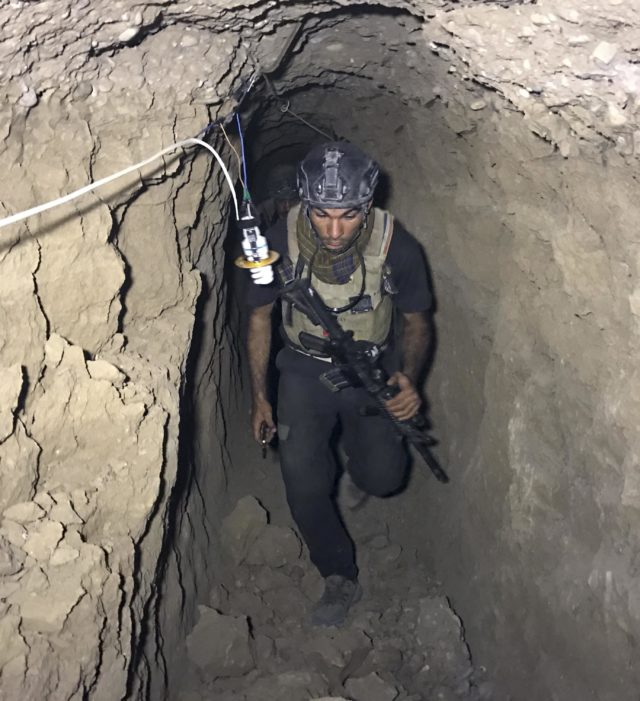
Briefs
Publication: Terrorism Monitor Volume: 17 Issue: 5
By:

Islamic State Fighters Regroup in Iraq, Rebuild Support and Smuggling Networks
Brian M. Perkins
The past several weeks has seen a surge in Islamic State (IS) attacks in Iraq as the U.S.-backed Syrian Democratic Forces (SDF) attempt to make a final push to eradicate IS from its last enclave in Baghouz, Syria. Despite the Iraqi government declaring victory over IS in December 2017, the group has still managed to conduct attacks across the country and estimates of how many IS fighters have crossed into Iraq in the past six months range to upwards of 1,000 (al-Hurra, February 22). In addition to the inflow of returning fighters, IS has also firmly entered a new structural and tactical phase akin to how it first managed to take root in Iraq—small self-contained cells operating relatively independently of one another.
These cells have focused on rebuilding support and smuggling networks while launching sporadic attacks on Iraqi security forces. While the group still operates in several provinces, Anbar and Nineveh are, unsurprisingly, the provinces that have witnessed the most notable IS activity in recent weeks.
In Nineveh, a series of bombings in Hadhra and Mosul killed two individuals and injured at least 28 others and an ambush on a convoy of Popular Mobilization Forces on Makhmour-Mosul road left six dead and more than 30 others wounded (Asharq Al-Awsat, March 10). In Anbar, IS fighters have been behind several kidnappings and bombings, including the February 9 bombing that targeted Iraqi forces in Kabisa, killing four soldiers and wounding several others (Iraqi News, February 9).
Iraqi forces responded to the surge of violence by launching a series of ground operations and airstrikes in Nineveh and Anbar. According to security officials, the operations have led to the capture and death of dozens of IS fighters (Kurdistan 24, February 21). A series of tunnels that IS has reportedly used as a hideout were also discovered and destroyed in Anbar’s Maheya Valley (Iraqi News, March 3). Further operations are likely to continue in the coming weeks, focusing primarily on rural hideouts in both provinces.
Despite the recent military operations to disrupt IS’ regrouping, Iraqi forces are facing a serious challenge in managing the flow of returnees evacuating from Syria. Efforts to prevent an IS resurgence there are likely to be hampered not only by the group’s strategic shift to small cells, but also by a lack of intelligence capabilities outside of urban areas and the lack of coordination between the disjointed Iraqi military and Popular Mobilization Forces. IS cells have already reestablished supply and smuggling routes in Anbar and Nineveh and into Erbil, and the lack of coordination across the organizations responsible for security in their respective provinces will make it difficult to prevent further infiltration and the group’s ability to regenerate itself.
***
Chad: Rebel Activity Along Libya-Chad Border Increasing as LNA Pushes South
Brian M. Perkins
The Chadian government has increasingly spoken out on jihadists and terrorists threatening its border with Libya. While jihadist groups do operate in southern Libya, the government has used the term “terrorists” in broad terms recently to describe a rising anti-government rebellion that is increasingly threatening the stability of the Chadian regime.
Chadian rebels have long operated in Libya, and the chaos throughout the country over the past several years has granted them significant freedom of movement, allowing them to engage in trafficking and act as mercenaries for Libyan militias. As the situation in Libya has improved, even if only slightly, and Khalifa Haftar, head of the Libyan National Army (LNA), continues to conduct military operations in southern Libya that began in mid-January, rebel groups will be pushed closer to the border and into Chad’s northern regions.
On February 3, French Mirage-2000s based near N’Djamena as part of France’s counter-terrorism Operation Barkhane conducted airstrikes against a Union des Forces de la Résistance (Union of Resistance Force—UFR) convoy of around 50 vehicles that reportedly intended to overthrow President Idriss Deby. French officials announced that the strike came in response to a formal request from President Deby (RFI, February 8). The airstrikes reportedly destroyed upward of 20 vehicles and Chadian authorities reported that they captured 250 “terrorists.” Despite the setback, the UFR’s spokesperson stated “We will continue to progress to N’Djamena” and that the group’s goal was to create “a transitional government bringing together all the forces of the country and to hold elections” (Bamada, February 11).
On March 5, Chad announced the closure of its border with Libya near the town of Kouri Bougoudi in response to the heightened violence along its borders, with the Chadian Minister of Security stating that the closure was intended to prevent terrorists from infiltrating the country (Libya Herald, March 5).). The closing also comes amid recent clashes between Sudanese and Chadian rebel groups near contested gold mines as well as the increasing threat posed against the government, most notably by UFR.
Tensions along the Libya-Chad border are likely to intensify in the coming months with Chadian rebels being pushed back into Chad as the LNA operations in southern Libya continue. While the French airstrikes were the first in Chad since 2008, given the current context and rising tensions along the border, it is likely that they set a precedent for further French support to President Deby in the coming year. The request for French support underscores the weaknesses of the Chadian military, which has been spread increasingly thin due to operating in numerous other theaters. France’s involvement in the Sahel is intended to strictly be for counter-terrorism, but it is unlikely that it will deny future requests for support given its broad investment in the security of the region, and the destabilizing effect the overthrow of the Chadian government would have, regardless of his autocratic tendencies.




